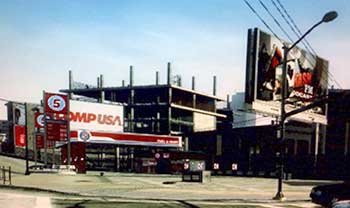|
I've been having a lot of fun playing the racing / car crashing game
Burnout:
Paradise. Well tuned racing, amazing car crash
simulations, and a rich open city to drive around in. A city with lots and lots of
advertising.
 What's amazing is the ads work. They're not offensive, they decorate the city appropriately. There's enough variety and turnover that the ads seem fresh. Amusing fake ads for "Good Kid Jellybeans" and "Rayfield Hotels" liven things up and fill the unsold inventory. And the ads are an interactive, integrated part of the world; you crash into a lot of Diesel cars on your way to smashing into billboards (albeit unbranded ones). The only ads that look sad are the drivable cars; you can spot the douche in the online game because he's the one that shows up in the Walmart-branded Formula One car. I'd love to know more about the economics of in-game ads. Burnout's ads come from IGA Worldwide; other online ad players are Microsoft (via aquiring Massive) and Google (via aquiring Adscape Media). So far all the game ads I've seen are branding, not lead generation. But what a brand platform! Captive users interacting with the ads, online updates both to monitor brand penetration and to sell new ads over time, lots of creative potential. The big wrinkle is that only some small fraction of games can accomodate brand ads. I'd hate to see game publishers stop developing fantasy RPGs because they can't work in Burger King advertising. |
||
